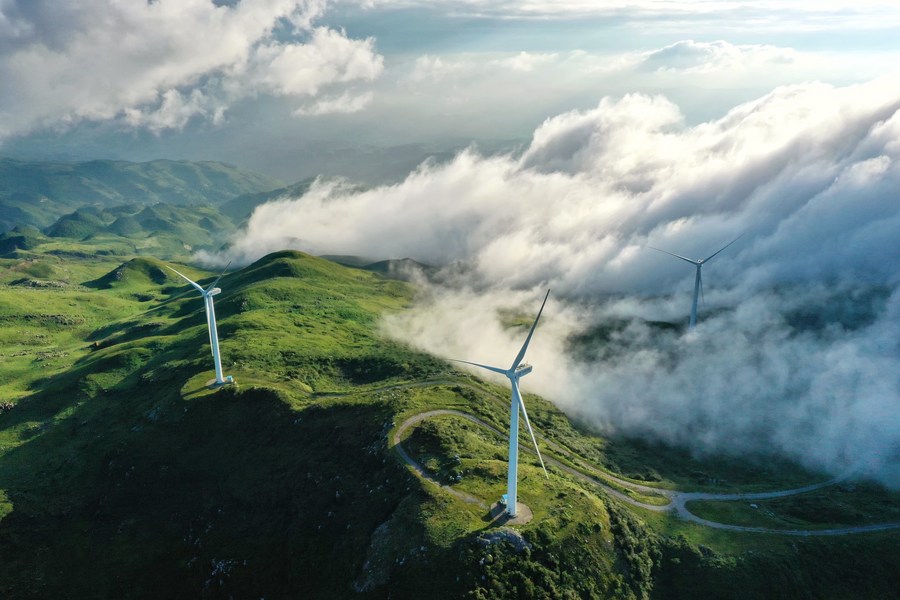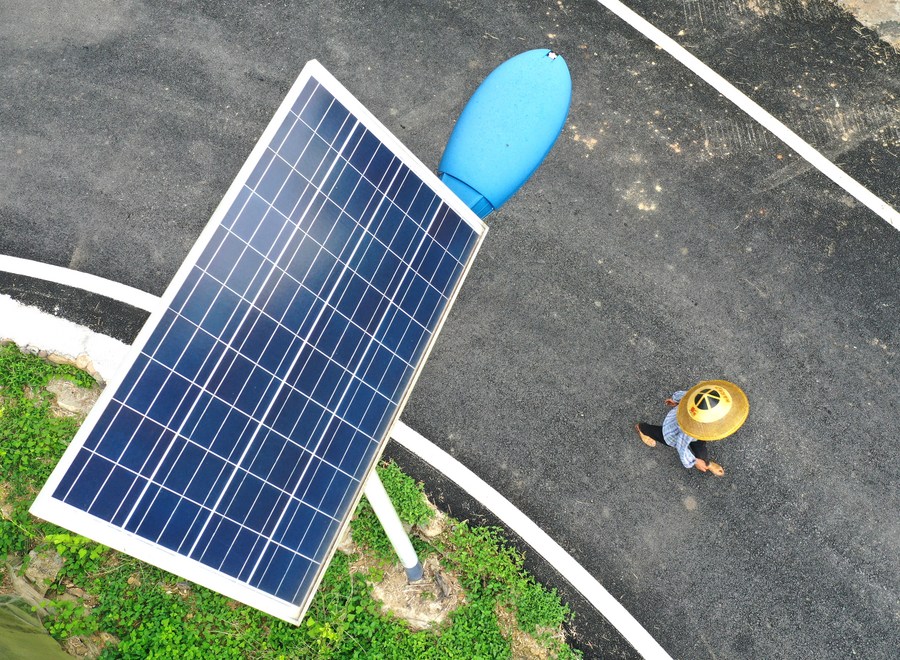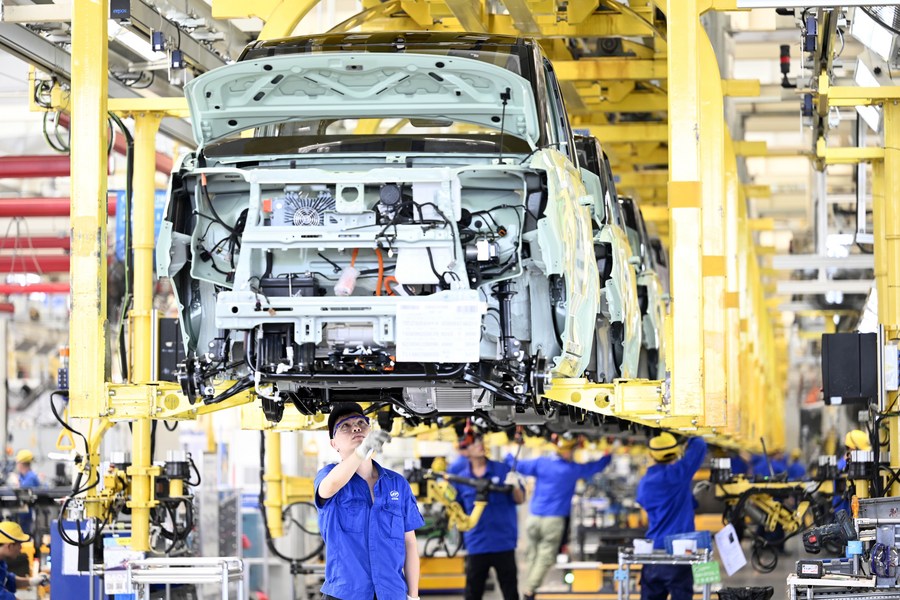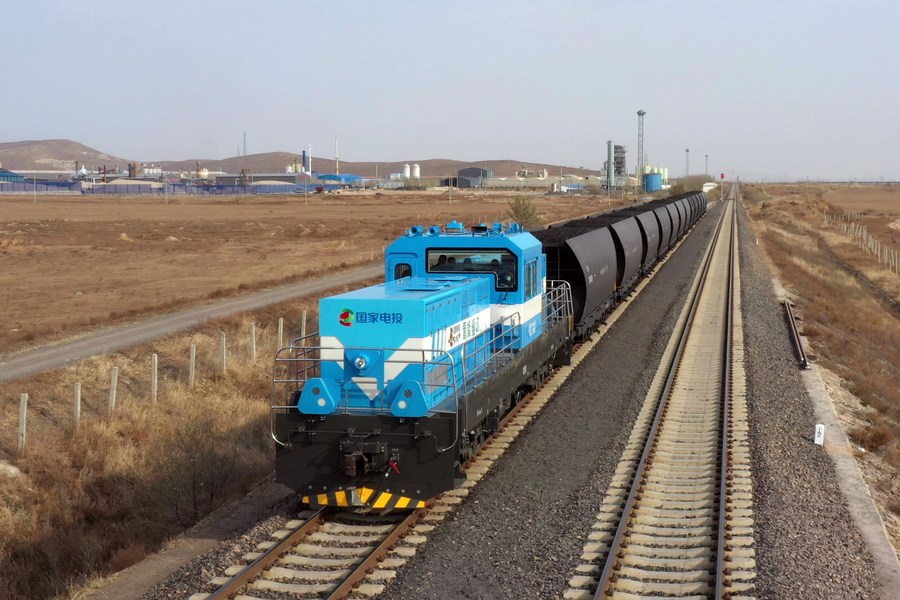
Amid a strong call to save the planet, China has set ambitious targets and taken solid actions to address climate change, injecting certainty to the global combat against the worrying issue.
"Visions will come true only when we act on them," Chinese President Xi Jinping said Monday in a written statement to the 26th United Nations Conference of Parties on Climate Change.
"Parties need to honor their commitments, set realistic targets and visions, and do their best according to national conditions to deliver their climate action measures," Xi said.

Aerial photo taken on Aug. 19, 2020 shows wind turbines at the Jiucaiping scenic area in southwest China's Guizhou Province. (Xinhua/Liu Xu)
China aims to peak its CO2 emissions before 2030 and achieve carbon neutrality before 2060. To meet these goals, the country has formulated and released a top-level design document for peaking carbon emissions and achieving carbon neutrality, and an action plan for peaking carbon emissions before 2030.
"Specific implementation plans for key areas such as energy, industry, construction and transport, and for key sectors such as coal, electricity, iron and steel, and cement will be rolled out, coupled with supporting measures in terms of science and technology, carbon sink, fiscal and taxation, and financial incentives," Xi said.
"Taken together, these measures will form a '1+N' policy framework for delivering carbon peak and carbon neutrality, with clearly-defined timetable, roadmap and blueprint," he said.

Aerial photo taken on July 22, 2021 shows a villager walking past a solar powered street lamp in Maobishan Village of Gongcheng Yao Autonomous County, south China's Guangxi Zhuang Autonomous Region. (Xinhua/Zhou Hua)
"Anyone who knows China well is sure my country is serious about reducing carbon emissions and pursuing green development, and that we mean what we say," Chinese Ambassador to Britain Zheng Zeguang said in an article published in The Guardian on Wednesday, shrugging off worries about whether China will honor its pledges to reduce emissions.
"Anyone familiar with China's political system knows that once decisions and goals are set by the Central Committee of the Communist Party of China and the top leader, they are incorporated into the overall national development program, turned into feasible action plans and delivered faithfully by local governments and competent departments," Zheng said.
China has long been hailed for thinking strategically and playing the long game. Scientific top-level design and strong implementation of plans are keys to the country's achievement on climate change.
In terms of climate action, China met its target for 2020 ahead of schedule. By the end of last year, carbon emissions intensity had come down by 48 percent compared with 2005, and non-fossil fuels accounted for 16 percent of primary energy consumption. China phased out 120 million kilowatts of installed coal-fired power generation capacity during the past decade.

Workers assemble new energy vehicles at an automobile company in Liuzhou, south China's Guangxi Zhuang Autonomous Region, Aug. 12, 2021. (Photo by Li Hanchi/Xinhua)
"The most crucially important contribution of China was its strong commitment to fighting against climate change," said former United Nations Secretary-General Ban Ki-moon in a recent interview with Xinhua.
Ban said China played "a decisive role" in the negotiation process of the Paris Agreement in December 2015, adding that without China's efforts, "we would not have the Paris Agreement on climate change even now."
As a responsible country, China is ready to share its experience and approaches with the rest of the international community. From supporting Africa in monitoring the climate system with satellite technology and building low-carbon pilot zones in Southeast Asia, to introducing energy-saving bulbs to small island countries, China's cooperation with less developed regions of the world has produced tangible results.
China has launched green action initiatives that encourage green infrastructure, energy, transportation and finance under the Belt and Road Initiative (BRI) framework. In 2020, 57 percent of China's investment in BRI partner countries went to renewable energy projects, up from 38 percent in 2019.

Photo taken on Oct. 29, 2021 shows the first China-developed hydrogen fuel cell hybrid locomotive in a trial run in north China's Inner Mongolia Autonomous Region. (Xinhua)
"Developed countries should not only do more themselves, but should also provide support to help developing countries do better," Xi said.
"Ancient Chinese believe that 'successful governance relies on solid action'. I hope all parties will take stronger actions to jointly tackle the climate challenge and protect the planet, the shared home for us all," Xi said.